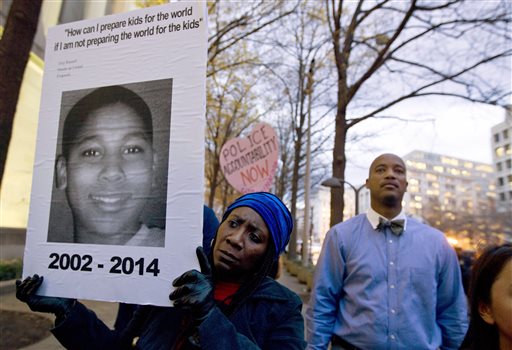
Body-Worn Cameras for Police
Cleveland Police have begun wearing cameras this month to record their interactions with the community. A pilot program was already in the works, but the decision may have been sped up by the shooting in November of 12-year-old Tamir Rice by a rookie officer.
According to the LA Times, “The cameras are to constantly record video of an officer's activities in 30-second loops, but are supposed to record longer sections of audio and video during police pursuits, vehicle stops and other interactions between officers and the public.”
Body-worn cameras have reduced the number of use-of-force complaints in other cities that use them. But a potential problem with Cleveland’s system is that officers have to manually switch between the recording systems, which some feel gives them “too much power to pick and choose what will be recorded,” the Times reports.
LaDoris Cordell, independent police auditor for the city of San Jose, addressed the use of body-worn cameras when she participated in a Center-sponsored panel on race, law, and ethics last month. "Body-worn cameras," she said, "will do much to bring transparency to policing provided that the police utilize protocols that are specific and have immediate consequences for officers who do not abide by them, and provided the protocols are online and available to the public."
Cordell also argued for other measures to improve transparency in policing:
In California, you have no right to know the names of officers against whom allegations of misconduct have been leveled. You have no right to know anything about the investigations into those misconduct allegations, even if you are the person who complained…. You have no right, in California, to know what, if any, discipline is imposed on officers, even if you were the complainant. The Peace Officers Bill of Rights passed by the California Legislature ensures that confidentiality and imposes criminal penalties on those who violate that confidentiality. But consider, at the same time, complaints against and discipline imposed upon lawyers, judges, physicians, are all matters of public record. There is no sunshine when it comes to policing in California. That needs to change.
Cordell’s remarks were part of a panel discussion on Unarmed African-American Men Dying in Encounters With the Police. Other panelists were Santa Clara County District Attorney Jeff Rosen, SCU Associate Provost for Diversity and Inclusion Aldo Billingslea, and retired Los Gatos Police Chief Scott Seamen. Margaret Russell, SCU professor of law, moderated.
